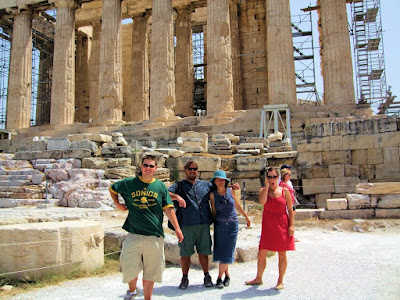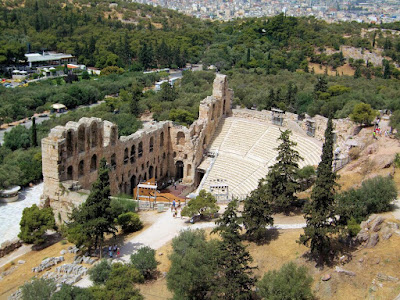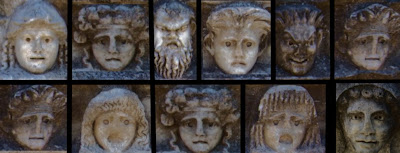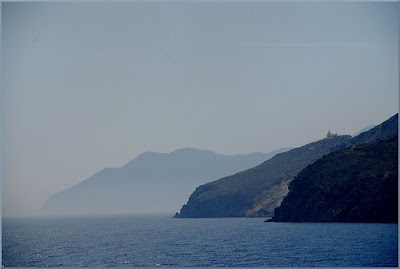Friday, July 18, 2008
Kara Güneş - great street music from Istanbul, Turkey
They play on the street a lot, as well as other venues, and are very good, and pretty young. I don't know a lot about them, other than they attract large crowds on Istikal (a very musical neighborhood) and most of what is written about them is in Turkish. They play native instruments and drums, but listening to their music, they I hear hints of musics from the west like rock and blues and folk/country accents of string band music. At times, their music reminds me of the jazz band Oregon, when they were really soaring...
Among the little I've been able to discover about them is that the late Kemal Kan, a Turkish director and writer, directed a movie of the same title once. I don't even know the titles of their songs, since the CD I bought from them didn't have functioning ID3 tags...so they're song 1, song 2, etc.
---o0o---
Thursday, July 17, 2008
The Brummets & One Curran return to America
It's nice to be home...it's sweatshirt weather tonight. We haven't felt anything in the 60s since we left. And it's great to be in a town where you can actually drink the tap-water. Other than Athens, we have bought every drop of water we drank. For some reason, Athens has great tapwater. Everywhere else we went, even the natives purchased their water.
I will write some more about the trip in the next few days, and share more photos...
---o0o---
Wednesday, July 16, 2008
Jack Brummet and Colum Brummet video clips from Greece
Colum sings
Jack shows how to order in Turkish
---o0o---
Aristophenes' Play Plutus at the Odeon of Herodes Atticus

Odeon of Herodes Atticus, shot from up the hill, on The Acropolis - click to enlarge
Tonight, we will go see Aristophane's last play, Plutus at the Odeon of Herodes Atticus, just a few blocks from our hotel. The play is being put on, oddly enough by the Cyprus Theatre Organisation. It is part of a drama, music and arts Athens Festival that takes place most of the summer in Athens.
When Pausanias visited Athens during the reign of Marcus Aurelius, he described the Herodeon as "the finest building of its type". I was not longer after destroyed by fire, and later, rebuilt in 161 AD by Herodes Atticus in memory of his wife. It was originally a steep-sloped amphitheater with a three-story stone front wall and a wooden roof, and was used as a venue for music concerts with a capacity of 5,000. It was later buried, plundered for its stone, and restored in the middle 20th century. It is probably best known (is this pathetic or what) as the venue for Yanni's Live At The Acropolis in the early 1990's.
Here are the opening lines of Aristophenes' play, Plutus [1]. We will be watching it in Greek, but I do have an English text. We suspect it will somehow be captioned (like they do in opera).
[The Orchestra represents a public square in Athens. In the background is the house of CHREMYLUS. A ragged old blind man enters, followed by CHREMYLUS and his slave CARIO.]
CARIO What an unhappy fate, great gods, to be the slave of a fool!
A servant may give the best of advice, but if his master does not
follow it, the pool slave must inevitably have his share in the disaster;
for fortune does not allow him to dispose of his own body, it belongs
to his master who has bought it. Alas! 'tis the way of the world.
But the god, Apollo, (in tragic style) whose oracles the Pythian
priestess on her golden tripod makes known to us, deserves my censure,
for surely he is a physician and a cunning diviner; and yet my master
is leaving his temple infected with mere madness and insists on following
a blind man. Is this not opposed to all good sense? It is for us,
who see clearly, to guide those who don't; whereas he clings to the
trail of a blind fellow and compels me to do the same without answering
my questions with ever a word. (To CHREMYLUS) Aye, master, unless
you tell me why we are following this unknown fellow, I will not be
silent, but I will worry and torment you, for you cannot beat me because
of my sacred chaplet of laurel.
CHREMYLUS No, but if you worry me I will take off your chaplets,
and then you will only get a sounder thrashing.
CARIO That's an old song! I am going to leave you no peace till you
have told me who this man is; and if I ask it, it's entirely because
of my interest in you.
CHREMYLUS Well, be it so. I will reveal it to you as being the most
faithful and the most rascally of all my servants. I honoured the
gods and did what was right, and yet I was none the less poor and
unfortunate.
CARIO I know it but too well.
CHREMYLUS Others amassed wealth-the sacrilegious, the demagogues,
the informers, indeed every sort of rascal.
CARIO I believe you.
CHREMYLUS Therefore I came to consult the oracle of the god, not
on my own account, for my unfortunate life is nearing its end, but
for my only son; I wanted to ask Apollo if it was necessary for him
to become a thorough knave and renounce his virtuous principles, since
that seemed to me to be the only way to succeed in life.
CARIO (with ironic gravity) And with what responding tones did the
sacred tripod resound?
CHREMYLUS You shall know. The god ordered me in plain terms to follow
the first man I should meet upon leaving the temple and to persuade
him to accompany me home.
CARIO And who was the first one you met?
CHREMYLUS This blind man.
CARIO And you are stupid enough not to understand the meaning of
such an answer! Why, the god was advising you thereby, and that in
the clearest possible way, to bring up your son according to the fashion
of your country.
CHREMYLUS What makes you think that?
CARIO Is it not evident to the blind, that nowadays to do nothing
that is right is the best way to get on?
CHREMYLUS No, that is not the meaning of the oracle; there must be
another that is nobler. If this blind man would tell us who he is
and why and with what object he has led us here, we should no doubt
understand what our oracle really does mean.
CARIO (to PLUTUS) Come, tell us at once who you are, or I shall
give effect to my threat. (He menaces him.) And quick too, be quick,
I say.
PLUTUS I'll thrash you.
CARIO (to CHREMYLUS) Do you understand who he says he is?
CHREMYLUS It's to you and not to me that he replies thus: your mode
of questioning him was ill-advised. (To PLUTUS) Come, friend, if
you care to oblige an honest man, answer me.
PLUTUS I'll knock you down.
CARIO (sarcastically) Ah! what a pleasant fellow and what a delightful
prophecy the god has given you!
CHREMYLUS (to PLUTUS) By Demeter, you'll have no reason to laugh
presently. . .
[1] The plot: The plot is of the simplest. Chremylus, a poor but just man, accompanied by his body-servant Cario--the redeeming feature, by the by, of an otherwise dull play, the original type of the comic valet of the stage of all subsequent periods--consults the Delphic Oracle concerning his son, whether he ought not to be instructed in injustice and knavery and the other arts whereby worldly men acquire riches. By way of answer the god only tells him that he is to follow whomsoever he first meets upon leaving the temple, who proves to be a blind and
ragged old man. But this turns out to be no other than Plutus himself, the god of riches, whom Zeus has robbed of his eyesight, so that he may be unable henceforth to distinguish between the just and the unjust. However, succoured by Chremylus and conducted by him to the
Temple of Æsculapius, Plutus regains the use of his eyes. Whereupon all just men, including the god's benefactor, are made rich and prosperous, and the unjust reduced to indigence.
---o0o---
Tuesday, July 15, 2008
Athens/Athinai, The Erectheum, The Parthenon, Aristophenes, Lord, Byron, The Acropolis, The Plaka, and The Phaedra Hotel

The family, minus Keelin at The Parthenon

Keelin at the Erectheum - click to enlarge

Jack in front of The Parthenon-click to enlarge

The family, minus Del, at the foot of the Parthenon. Click to enlarge.

I loved this advertisement for absinthe in a liquor store window. It kind of captures both the spirit of Van Gogn AND absinthe. Click to enlarge.
We are staying in a wonderful hotel--The Phaedra--in the heart of the Plaka, just down the hill from the Acropolis, in the middle of Athens.
Since it was going to be around 104 fahrenheit today, we got a fairly early start, walking up the hill to the Acropolis, and stopping to gaze at a few other monuments along the way. As it turns out, one of my very favorite 19th Century poets, Lord Byron a/k/a George Gordon, made a big splash in Athens, and The Plaka. There are monuments to him, numerous plaques, and even a street named after him. He may have been a scandalous libertine, but the Hellenikis love him!
One monument commemorating Lord Byron lies in the very same plot of land near the plaka where the tomato was first introduced and grown in Greece! Wow. Considering how great and totally ubiquitous the tomato is here, it's amazing.
Since our 1982 visit, The Acropolis has been greatly enhanced, opened up, restored, with new buildings and areas opened up to the public. When we came here in '82, there was one way in, and a lot of closed off areas that have been excavated and restored in the ensuing years, The Acropolis, and particuarly The Parthenon and The Erectheum, with its wonderful Catydid (msp?) statues are even more impressive than before. The theatre is in the middle of restoration, and like all the many theatres we've seen, awe-inspiring.
I love this place! It's so great to walk around the Acropolis again, and see where all those great things happened and all those great works of art were made, and all those great thoughts were thought. Thank you Socrates!

The Odeon theatre, on The Acropolis, where we will watch an Aristophenes play in Greek tomorrow night--click to enlarge
Tomorrow, we check out some more ruins, monuments, and go to the fantastic and huge museum here. And even better, perhaps, tomorrow night we are attending a performance of an Aristophenes play in the ancient Odeon theatre, at sunset. Is this cool, or what? And the next morning at 5 AM we begin the long journey home, first to London, then to Vancouver, B.C., and finally Seattle Thursday night.
---o0o---
Athens/Athinai, Hellas: It will hit 40 degrees celsius today (e.g., 104 fahrenheit)

The Acropolis
We are in our first full day in Athens, where it will hit 40 degrees celsius this afternoon (104 fahrenheit),
f = 9/5 c + 32
We will be visiting the fantastic and huge museum we went to last time, as well as visiting the Acropolis and its excellent ruins at least a couple of times.
Tomorrow night, on our last night here, we currently plan to attend a play in an ancient theatre. Aristophenes. And in between, we will visit other ruins, if possible, try to keep cool, and face up to our trip coming to an end, about which, more later.
---o0o---
A few random pictures from Greece

click these to enlarge. A picture we took that turned out colored like a 1960's postcard
On the beach at Naxos yesterday before we sailed to Athens
The dome and stone set in masonry walls of the tiny (no longer used) St. Giorgio's Greek Orthodox church at Hilka
Some of the very intact female statuary recovered from Knossos

some of my favorite faces from the fallen friezes at Afrodesia
Colum with an old still at the Citron shop in Hilka (msp?). Let me publicly apologize to Colum because I just discovered that I have frequently been writing his name as Column! You don't know how many columns I've looked at in the last month!
Love and Mercy,
Jack in Athens, July 15th, 2008 (two days to go...).
Poem: Sailing To Athens

1.
In a pale grey fog,
I see the ghosts
Of ancient Helleniki mariners
Sailing phantom steamships, sloops,
Prams, dories, catamarans, dinghies,
Trawlers, purse-seiners, frigates and tugboats
Across the cerulean blue sea,
Trawling for the fish
That are phantoms now too.
2.
Wine, saffron, ruby-red, pale lemon;
Emerals peppers, rocket, and capers;
Pink carpusi, crystal white Ouzo;
Cheeses in every tint
From snow white to ivory,
Cream, tan, grey, and muted gold.
3.
Gifts of olive oil, wine, raki, ouzo,
Apricots, plums, cake, ice cream,
Citron, carpusi, sorbet, wildflowers,
More caprusi, poetry, more ouzo, and songs
Sung on the street
Direct from the heart.
4.
I leave with a song in my heart
And knowing whatever we sing, eat, play,
Drink, wear, smoke, worship, or dream,
They're all just people
Like you and me.
Amen. Selah. Namaste.
---o0o---
Monday, July 14, 2008
Poem: Sailing To Naxos, or, The Vortex
On a hot day in a steamy haze,
Our ship makes a wide looping turn
A few kilometers off
The white house-dappled shore
Of Naxos, parked in the sea
Like a gem in a finding,
The houses and villas
Strung along the shore
And two layers above
Like a three strand pearl necklace
On the stout and broad neck of a Cyclops,
Waiting to leap from the sea,
Grab our boat from the water
And use the ship to beat the sea
Into a churning and foaming
Soup of blue whirlpools and funnels
That suck everything in sight
Into a sapphire blue vortex
With the water cooling each meter
As it swirls down and cascades
Into Neptune's drain and picks up speed
As it descends into the dark
And lonely bottom of the sea.
July 13, 2008, on the Aegean and Naxos
---o0o---
Sunday, July 13, 2008
Changes I've noticed in Greece, Part 1, or, I miss the old Retsina
St. Francis of Assisi outside his church in Rhodes - click to enlarge
I don't have much time to do this--the Germans are patiently watching me, and of course, they can read this too, since they sit five feet behind me. OK, I am uploading this off the USB stick, and hope I edited it when I wrote it (I don't remember!).
Changes in Europe in general - I won't focus on how very expensive it is here. Unlike our last trip, we've seen very few Americans. It is very pricy in Europe right now, even in lower cost destinations like Turkey and Greece.
Jack outside a console club in Rhodes...the consoles are Game Cube, PS/2, and XBox
The E.U. seems like the biggest change, and it really feels like the destinies of most of the EU countries are now even more strongly interlinked than ever before. The common currency in particular seems both an aspirational thing and a burden. I kind of miss Drachmas.
Retsina - When we were in Greece in 1982, almost al the restsina you drank came from a wooden barrel, often served in a ceramic or copper pitcher. We have had a lot of retsina on this trip, but none so far has come from the barrel (at least directly). It is almost always served in 500 ML bottles (a regular bottle of wine is 750 ML). It is still pretty cheap. Back then it was about $1.00 a bottle. Now, it is more like 2-3 Euros for the 500 ML size ($3 to $4.50 USD). I kind of miss some of that barrel retsina, since once in a while you’d get some heavily resinated wine. Now, it is resinated, but not too much. I miss that more over the top version, unsurprisingly—who wants subtle? Claire seems to like Retsina, but Column does not…in fact he coined the name Wine-Sol for it.
English - Since this was my first trip to Turkey. I don’t know how their English was way back when. But I thought they spoke a surprising amount this time around. Even though we’ve seen very few Americans on this trip, and not all that many Aussies or Brits, English is spoken much more in Greece than before. Not so much as anaccomodation to language-weak Americans, but as the mutual language between Euro-language speakers. It is common to see, say, a German, a Greek, A japanese and a Dutch person speaking English...their one common language.
If signs plaques, or posters are translated, they are almost always in both Greek and English. Museums in particular follow this convention. In Greece, street signs are often now transliterated. When I was here before, you had to at least learn the Greek alphabet to get around.
The American Presidency - Some things never change. When we were here in 1982, the Europeans did not at all like our President, Ronald Reagan. In 2008, they really really do not like our President, George Bush. Our landlord laughingly made the cut his throat sign about Bush when she asked us what we thought about Mr. Bush. He has not made anything easier for anyone here, and most of these countries—part of the “coalition”—lost boys in Iraq and Afghanistan.
Greeks in particular seem fond of “America.” As far as I can tell, mainly because there is a large Greek community in America, and almost all of them have an uncle, cousin, aunt, or brother living in the United States. Or maybe it’s because of Telly Savalas. More on the changes later. Love, Jack
---o0o---
Naxos - 37 hours and our final island hop before Athens
Our two little friends who thought we'd come to feed them -click to enlarge
